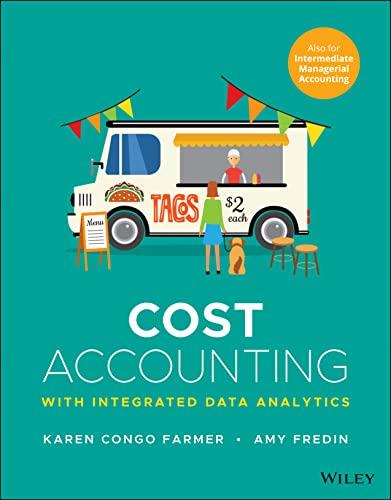Question
Differential Analysis for Sales Promotion Proposal Sole Mates Inc. is planning a one-month campaign for July to promote sales of one of its two shoe
Differential Analysis for Sales Promotion Proposal
Sole Mates Inc. is planning a one-month campaign for July to promote sales of one of its two shoe products. A total of $120,000 has been budgeted for advertising, contests, redeemable coupons, and other promotional activities. The following data have been assembled for their possible usefulness in deciding which of the products to select for the campaign:
| Tennis Shoes | Walking Shoes | ||||||
| Unit selling price | $72 | $79 | |||||
| Unit production costs: | |||||||
| Direct materials | $13 | $17 | |||||
| Direct labor | 4 | 6 | |||||
| Variable factory overhead | 3 | 4 | |||||
| Fixed factory overhead | 7 | 9 | |||||
| Total unit production costs | $27 | $36 | |||||
| Unit variable selling expenses | 23 | 22 | |||||
| Unit fixed selling expenses | 13 | 8 | |||||
| Total unit costs | $63 | $66 | |||||
| Operating income per unit | $9 | $13 | |||||
No increase in facilities would be necessary to produce and sell the increased output. It is anticipated that 19,000 additional units of tennis shoes or 16,000 additional units of walking shoes could be sold from the campaign without changing the unit selling price of either product.
Required:
1. Prepare a differential analysis as of June 19 to determine whether to promote tennis shoes (Alternative 1) or walking shoes (Alternative 2). If an amount is zero, enter "0". Use a minus sign to indicate subtracted amounts, negative amounts, or a loss.
| Differential Analysis | |||
| Promote Tennis Shoes (Alt. 1) or Promote Walking Shoes (Alt. 2) | |||
| June 19 | |||
| Promote Tennis Shoes (Alternative 1) | Promote Walking Shoes (Alternative 2) | Differential Effect on Income (Alternative 2) | |
| Revenues | $ | $ | $ |
| Costs: | |||
| Direct materials | |||
| Direct labor | |||
| Variable factory overhead | |||
| Variable selling expenses | |||
| Sales promotion | |||
| Income (Loss) | $ | $ | $ |
2. Determine whether to promote tennis shoes (Alternative 1) or walking shoes (Alternative 2).
3. The sales manager had tentatively decided to promote walking shoes, estimating that operating income would be increased by $88,000 ($13 operating income per unit for 16,000 units, less promotion expenses of $120,000). The manager also believed that the selection of tennis shoes would increase operating income only by, $51,000 ($9 operating income per unit for 19,000 units, less promotion expenses of $120,000). State briefly your reasons for supporting or opposing the tentative decision.
The sales manager's tentative decision should be . The sales manager considered the full unit costs instead of the differential (additional) revenue and differential (additional) costs. An analysis similar to that presented in part (1) would lead to the selection of for the promotional campaign, because this alternative will contribute to operating income than would be contributed by promoting .
Differential Analysis Involving Opportunity Costs
On July 1, Matrix Stores Inc. is considering leasing a building and buying the necessary equipment to operate a public warehouse. Alternatively, the company could use the funds to invest in $151,300 of 5% U.S. Treasury bonds that mature in 16 years. The bonds could be purchased at face value. The following data have been assembled:
| Cost of store equipment | $151,300 | |
| Life of store equipment | 16 years | |
| Estimated residual value of store equipment | $18,900 | |
| Yearly costs to operate the warehouse, excluding depreciation of equipment | ||
| depreciation of store equipment | $57,000 | |
| Yearly expected revenuesyears 1-8 | 76,000 | |
| Yearly expected revenuesyears 9-16 | 69,200 | |
Required:
1. Prepare a differential analysis as of July 1 presenting the proposed operation of the warehouse for the 16 years (Alternative 1) as compared with investing in U.S. Treasury bonds (Alternative 2). If an amount is zero, enter "0". For those boxes in which you must enter subtracted or negative numbers use a minus sign.
| Differential Analysis | |||
| Operate Warehouse (Alt. 1) or Invest in Bonds (Alt. 2) | |||
| July 1 | |||
| Operate Warehouse (Alternative 1) | Invest in Bonds (Alternative 2) | Differential Effect on Income (Alternative 2) | |
| Revenues | $ | $ | $ |
| Costs: | |||
| Costs to operate warehouse | |||
| Cost of equipment less residual value | |||
| Income (Loss) | $ | $ | $ |
2. Based on the results disclosed by the differential analysis, should the proposal to operate a retail store be accepted?
3. If the proposal is accepted, what is the total estimated income from operations of the warehouse for the 16 years? $
Step by Step Solution
There are 3 Steps involved in it
Step: 1

Get Instant Access to Expert-Tailored Solutions
See step-by-step solutions with expert insights and AI powered tools for academic success
Step: 2

Step: 3

Ace Your Homework with AI
Get the answers you need in no time with our AI-driven, step-by-step assistance
Get Started


